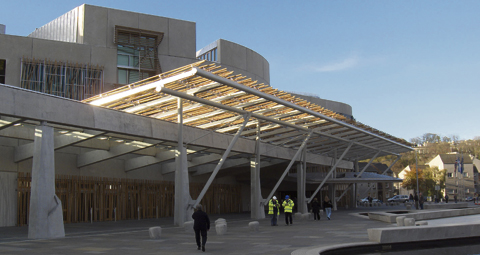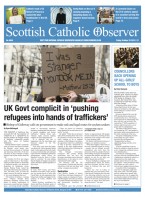November 29 | ![]() 0 COMMENTS
0 COMMENTS ![]() print
print

Calls for official apology over historic anti-Catholicism
The Catholic Church in Scotland has suggested that the Scottish Goverment apologise over historic anti-Catholicism, to ‘repair and renew’ affected communities.
The director of the Catholic Parliamentary Office has described the review into current hate crime legislation as an ‘opportunity’ to have it rationalised and made simpler.
Anthony Horan, who submitted a detail response to the review on behalf of the Bishops’ Conference of Scotland, said: “This process is an opportunity, ultimately, to ensure that the legislation is just and that every group is protected. “This does not have to be a ‘zero sum game’ where one group ‘wins’ and another ‘loses’ but rather could be an opportunity to rationalise and simplify legislation.
“A desirable outcome would be a single aggravation such as section 74 of the Criminal Justice (Scotland) Act 2003.
“Applied to all protected characteristics equally, it would be a simple and straightforward ‘message’ which would foster harmony in that all groups would be treated equally in the eyes of the law.”
“It is important that any legislation, preserves judicial discretion recognising that Scotland has a criminal justice system populated by highly trained prosecutors and judges,” Mr Horan added. “They are best placed to assess the strengths and weaknesses of individual cases and should be free to do so in the absence of their descision being ‘politicised’ by legislation which creates a preceived ‘scandal’ where none exists.”
In their response, the Church also pointed out the history of anti-Catholicism in Scotland, asking the Scottish Goverment to give recognition to the historical origins of present conflicts, and noted that for more than 20 years that the government have put resources towards programmes that tackle sectarianism, but that during this time period there has also been a growth in religious hate crime.
“Having devoted significant resources to the symptoms of sectarianism it is now appropriate that some attention is being given to its cause, through this review,” added the response. “In this context, an opportunity exists to acknowledge that anti-Catholic sectarianism is qualitatively and quantitatively different from other types of religious hate crime in Scotland.
“Instances of anti-Catholicism outnumber all other types of religious hate crime combined, in a country where Catholics represent only 16 per cent of the population.
“This is a product of the Reformation Parliament of 1560 and its condemnation of Catholic doctrine and worship including the ban on the celebration of all Catholic Sacraments. No other religion or belief has ever been so proscribed in Scotland, the legacy of this proscription continues to the present day.
“A reccomendation by this review, that the Scottish Government consider issuing a collective, retrospective apology could go some way towards building, repairing and renewing bonds between communities harmed by historical wrongdoing. It could also be the first step in addressing historical iniquities.”
The independent review was announced on January 26 this year, and is chaired by Lord Bracadale.
Lord Bracadale will consider whether the current legislation best presents the most effective method of dealing with hate crimes, and following analysis of the responses received during the consultation period, will give his reccomendations on a number of areas of the law.
These areas were outlined on the Scottish Goverment webiste as: “whether the current mix of statutory aggravations, common law powers and specific hate crime offences is the most appropriate criminal law approach to take; whether the scope of existing laws should be adjusted, including whether the religious statutory aggravation should be adjusted to reflect further aspects of religiously motivated offending; whether new categories of hate crime should be created for characteristics such as age and gender (which are not currently covered); whether existing legislation can be simplified, rationalised and harmonised in any way, such as through the introduction of a single consolidated hate crime act; and how any identified gaps, anomalies and inconsistencies can be addressed in a new legislative framework, ensuring this interacts effectively with other legislation guaranteeing human rights and equality.”










